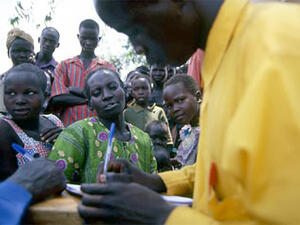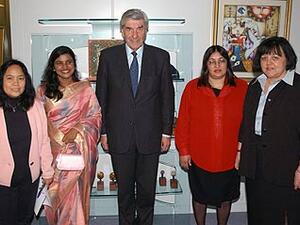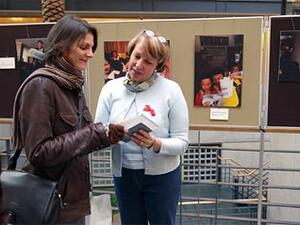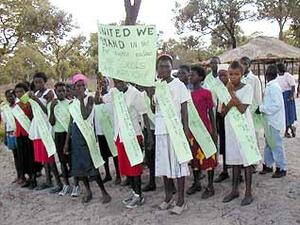High Commissioner in Afghanistan
High Commissioner in Afghanistan
In Kabul today, High Commissioner Ruud Lubbers discussed with Chairman Hamid Karzai of the Afghan Interim Administration UNHCR's strategy for the repatriation and reintegration of Afghan refugees and internally displaced people.
Lubbers' meeting with Karzai came as the number of Afghans returning from Pakistan under a UNHCR joint repatriation programme that began on March 1 topped a quarter of a million.
In their meeting, Lubbers told Karzai that security is indispensable to repatriation. But more importantly, he said, successful reintegration would lead to stability.
Karzai said reintegration was one of the top priorities of the Interim Administration and expressed his appreciation for UNHCR's long involvement and assistance to Afghans.
The two met at the Presidential Palace for 40 minutes. Lubbers arrived in Kabul on Monday evening from the Iran-Afghan border, where on Sunday he saw some of the 1,000 Afghan refugees who crossed the border into Afghanistan that day under a heavy rain.
Lubbers said security in the countryside was crucial if people are to be encouraged to return to rural areas and to avoid returns only to urban areas. That means we need packages of assistance, he said. UNHCR is basically concentrating on shelter and water, but we are working with other organizations for other things as well.
In addition to surpassing the 250,000 return figure from Pakistan yesterday, UNHCR also began assisted repatriations from the capital region, Islamabad. Some 100 Afghans who had been living in the Islamabad area registered with a mobile UNHCR team in the city. Many of those registering were educated, including several teachers who said they were giving up jobs in Pakistan to return home to help rebuild their country.
At the current rate of returns, Lubbers said he expected that this year's target figure of 400,000 returns from Pakistan would probably be reached this summer. He said repatriation from Iran, which started on 9 April, would likely pick up substantially after a relatively slow start. The number returning from Iran on Monday was about 1,500, up from around 1,000 the day before. Lubbers said many of the Afghan refugees had found jobs in Iran and would be slower to make a decision to go home.
Following his arrival in Kabul, the High Commissioner went to the Pul-i-Charkhi centre in the outskirts of the city, where returnees from Pakistan receive a travel grant of $20 per person (or $100 per family of five), a UNHCR package of relief supplies and 150 kgs of food from the World Food Programme.
Asked about a funding shortfall for Afghanistan, Lubbers said he told donors "not to let me down, but there is always a difficulty to translate [pledges] into cash." UNHCR as of 10 April had raised more than $160 million of the $271 million needed through the end of the year. UNHCR currently has 20 offices and field units in Afghanistan, manned by 322 national and 75 international staff members.
Tomorrow (Wednesday), Lubbers is scheduled to travel to Jalalabad, visit a camp for internally displaced people at Hesar Shahi and a centre at Mohmandara providing transportation expenses to returnees. Then he heads for Peshawar and Islamabad, Pakistan, where he will meet with President Parvez Musharraf.
The eight-day visit to the Afghanistan region is Lubbers' third in 12 months.





